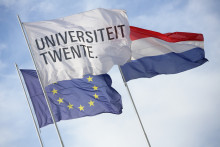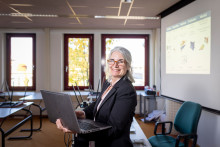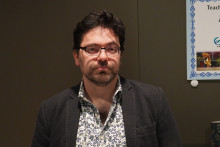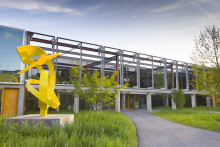GEM will be delivered by a consortium of four European universities: Lund University (Sweden), Université catholique de Louvain (Belgium), the University of Tartu (Estonia) and the University of Twente as the programme coordinator. Students will be able to choose two of these institutes, spend a year in each one, and earn a double degree. ITC professor Andy Nelson, GEM coordinator at the UT, explains more.
Why start a new joint Master programme? Where did the idea come from?
Nelson: ‘We were looking at the big development agendas focused on sustainability and environmental challenges, such as the UN Sustainable Development Goals and the European Commission’s Green Deal. Making progress towards these goals requires investment in new knowledge, technology and business strategies. We found that there was no programme that would tick all the boxes of required knowledge. GEM integrates academic expertise from four universities, which all focus on geo-information science from different perspectives.’
What are the benefits of GEM compared to other programmes?
‘GEM is a unique programme for students who want to tackle emerging global issues. It will offer a diverse classroom, bringing in students from all over the world. Because they will spend time at two universities, it will help them understand different European cultures. We also aim to offer a lot of interaction with stakeholders, so that we can prepare students for the working environment. There is a large network of businesses, NGO’s and other organisations associated with GEM, where students can gain experience in the classroom, in internships or in their MSc thesis research. On top of that, this type of collaboration broadens the expertise of our staff. There will be a lot of interaction with the partners, we can learn from each other and adopt each other’s good practices. The programme is about mobility and making education more flexible and attractive.’
How will the programme work in practice? Who can sign up and what can they expect?
‘Interested students can already start applying. The students will be selected based on their grades and motivation to have a career in monitoring of environmental issues. The first group will start the study in September 2021. The programme is funded by the European Union’s Erasmus+ programme. Thanks to that, we are able to offer around 15 scholarships per year, although we welcome students with other sources of financial support too. If we can attract about twenty students per year, that would be great.’
GEM is a joint programme, but it results in a double degree. Is that correct?
‘Yes, exactly. Students can choose from four tracks, Urban-Rural Interactions, Land Use Systems, Ecosystems & Natural Resources, and Food Security. Depending on their choice of track, they either spend their first year at the University of Tartu or at Lund University; and for their second year they move on to either Université Catholique de Louvain or the University of Twente. In the end, they receive a double degree from the two universities they selected. The ‘jointness’ in the programme comes from the interactions and events in the curriculum that involve all students and staff regardless of which track they are in. That said, we do have the ambition to eventually create a joint degree with all four partners, but the process of formally gaining joint degree accreditation across four universities in four different countries will take time and is a challenging ambition to realise.’







